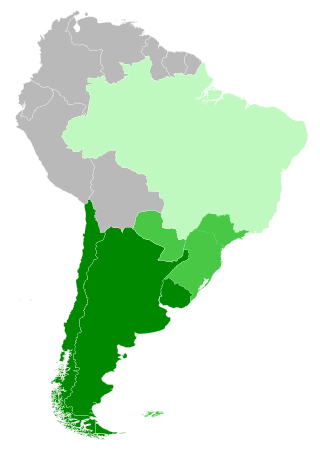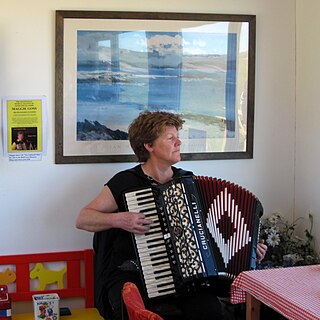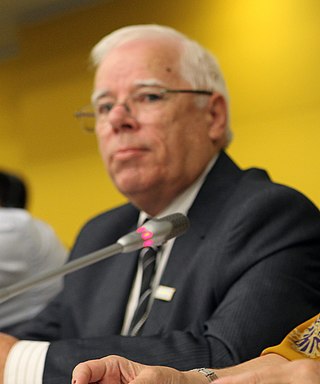
Demographic features of the population of Equatorial Guinea include population density, ethnicity, education level, health of the populace, economic status, religious affiliations and other aspects of the population.

The history of the Falkland Islands goes back at least five hundred years, with active exploration and colonisation only taking place in the 18th century. Nonetheless, the Falkland Islands have been a matter of controversy, as they have been claimed by the French, British, Spaniards and Argentines at various points.

South America is a continent entirely in the Western Hemisphere and mostly in the Southern Hemisphere, with a considerably smaller portion in the Northern Hemisphere. It can also be described as the southern subregion of the Americas.
Saint Helena, Ascension and Tristan da Cunha are British Overseas Territories in the south Atlantic Ocean.

The Southern Cone is a geographical and cultural subregion composed of the southernmost areas of South America, mostly south of the Tropic of Capricorn. Traditionally, it covers Argentina, Chile, and Uruguay, bounded on the west by the Pacific Ocean and on the east by the Atlantic Ocean. In terms of social, economic and political geography, the Southern Cone comprises Argentina, Chile, and Uruguay, and sometimes includes Brazil's four southernmost states. In its broadest definition, taking into account common history and geography, it also includes Paraguay, another Spanish-speaking country.
Afro–Latin Americans or Black Latin Americans are Latin Americans of full or mainly sub-Saharan African ancestry.
Latin Americans are the citizens of Latin American countries.

The culture of the Falkland Islands is essentially analogous to that of British culture. The Falkland Islands have a large non-native born population, mainly white and from England, but also from Saint Helena.

The Falkland Islands is an archipelago in the South Atlantic Ocean on the Patagonian Shelf. The principal islands are about 300 mi (480 km) east of South America's southern Patagonian coast and about 752 mi (1,210 km) from Cape Dubouzet at the northern tip of the Antarctic Peninsula, at a latitude of about 52°S. The archipelago, with an area of 4,700 sq mi (12,000 km2), comprises East Falkland, West Falkland, and 776 smaller islands. As a British overseas territory, the Falklands have internal self-governance, but the United Kingdom takes responsibility for their defence and foreign affairs. The capital and largest settlement is Stanley on East Falkland.

As of 2017, South America has an estimated population of 418.76 million people.

Falkland Islanders derive from various origins. Earliest among these are the numerically small but internationally diverse early 19th century inhabitants of the Falkland Islands, comprising and descended in part from settlers brought by Luis Vernet, and English and American sealers; South American gauchos who settled in the 1840s and 1850s; and since the late 1830s, settlers largely from Britain with a minority from other European countries. There has also been significant recent contributions from Saint Helena and Chile.

Falkland Islands English is the dialect of the English language spoken in the Falkland Islands. Though it is mainly British in character, as a result of the remoteness of the islands, the small population has developed and retains its own accent and dialect, which persists despite many immigrants from the United Kingdom in recent years. In rural areas, known as 'Camp', the Falkland accent tends to be stronger. The dialect has resemblances to Australian, New Zealand, West Country and Norfolk dialects of English, as well as Lowland Scots.

European emigration is the successive emigration waves from the European continent to other continents. The origins of the various European diasporas can be traced to the people who left the European nation states or stateless ethnic communities on the European continent.

The following outline is provided as an overview of and topical guide to the Falkland Islands:

Foreign relations between the Argentine Republic and the United Kingdom of Great Britain and Northern Ireland have existed for over two centuries.
The British diaspora consists of people of English, Scottish, Welsh, Northern Irish, Cornish, Manx and Channel Islands ancestral descent who live outside of the United Kingdom and its Crown Dependencies.
Janet Robertson is an Argentine-born Falkland Islands politician who served as a Member of the Legislative Assembly for the Stanley constituency from 2005 until 2009. Robertson was elected as a Member of the Legislative Council, which was reconstituted into the Legislative Assembly with the implementation of the 2009 Constitution.

Alejandro Jacobo Betts was a Falklands-born Argentine air-traffic controller and activist who worked with the Argentine government as a technical advisor on the Tierra del Fuego's Malvinas Question Provincial Observatory Advisory Council. Betts supported Argentina's claim to the Falkland Islands and was a controversial figure in the Falklands as a result. Betts also was the older brother of Terry Betts, who served as a member of the Falkland Islands Legislative Council and assisted British forces in the Falklands War. His younger brother Peter served in the British Task Force.

Panamanians are people identified with Panama, a country in Central America and with residential, legal, historical, or cultural connections with North America. For most Panamanians, several or all of these connections exist and are collectively the source of their Panamanian identity. Panama is a multilingual and multicultural society, home to people of many different ethnicities and religions. Therefore, many Panamanians do not equate their nationality with ethnicity, but with citizenship and allegiance to Panama. The overwhelming majority of Panamanians are the product of varying degrees of admixture between European ethnic groups with native Amerindians and Black Africans.













